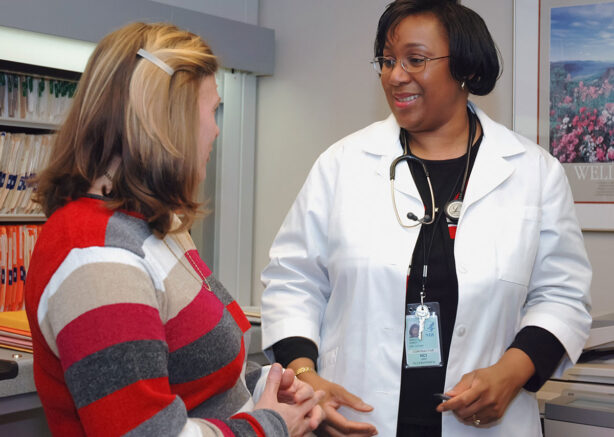When it comes to ensuring good physical health, we all know there are a few basic rules to follow.
Things like eating healthy meals, exercising regularly, and getting enough sleep are essential for our overall health.

But, regular visits to your family doctor are also an essential part of ensuring you stay healthy as well.
And, ensuring you get any recommended health screenings can help you identify potential future health issues and detect diseases sooner.
If you’re wondering about the importance of medical checkups and screenings, read on to learn about how to take control of your health today.
How often do I need to visit a doctor?
Do you ever wonder how often you should be visiting the doctor for a check-up?
The answer to this question will vary depending on your age, gender, and health status.
But, the general rule is that adults between 18 and 64 should be visiting their primary care physician at least once every year for a routine physical exam.
Women in the same age range should also visit a gynecologist oncologist for cervical cancer screening at least once every three years.
For those that are 65 years old or older, or those that have chronic medical conditions, more frequent visits to your family doctor may be necessary.
Consider scheduling appointments every three to six months to monitor and manage any ongoing health issues.
Remember that regular check-ups can be a big help in detecting potential health problems early on, before they become serious medical issues.
And, if you happen to develop any concerning symptoms at other times throughout the year, you should always reach out to your doctor to help diagnose and treat your issues.
Which health screenings are most important?
Screening tests detect diseases in their early stages, when they’re easier to treat and more likely to be curable.
Any specific screening tests you need will depend on your risk factors, age, and gender.
Common screening tests may include:
- Blood pressure checks for hypertension (high blood pressure)
- Cholesterol levels for heart disease prevention
- Mammograms for breast cancer detection in women over 50 years old, or those with a family history of breast cancer
- Colonoscopies for colorectal cancer
- Skin exams for melanoma (skin cancer) detection, if you have a history of sunburns or use tanning beds frequently
- STI testing, recommended yearly or as needed depending on the sexual activity
The first step in any health screening process is to talk with your healthcare provider about which tests you might need based on your medical history and current lifestyle.
Being proactive and putting a focus on preventative care can help catch potential issues before they become bigger health concerns.
What are the benefits of regular health screenings?
Regular health screenings are essential for maintaining optimal health and helping to prevent serious illnesses. But, aside from that, they have some additional benefits worth considering:
Identify risk factors
During many common health screenings, healthcare professionals assess various aspects of an individual’s health, including blood pressure, cholesterol levels, body mass index, and blood glucose levels.
Having a clear view of these factors can give you a better view of your overall health, and any risk factors that may be present in your lifestyle.
Earlier detection of cancer
Through regular screenings and diagnostic tests, healthcare professionals can identify cancer at its early stages, often before symptoms manifest and the disease is more treatable.
Early detection enables prompt intervention, allowing for a range of treatment options that might include surgery, radiation therapy, chemotherapy, immunotherapy, and targeted therapies.
As with many diseases, earlier detection and treatment usually leads to better results when treating a serious illness.
Long-term well-being
Regular screenings serve as a proactive measure, to monitor key health indicators, detect potential risk factors, and intervene early to minimize their impact.
By staying proactive and engaged in your overall health, you’ll be better able to make informed decisions about lifestyle modifications, receive necessary treatments, and engage in preventive measures that contribute to long-term well-being.
This can mean that instead of eventually needing surgery or daily medication, you might be able to manage with simple lifestyle changes like lowering your salt intake or taking physiotherapy classes at Pillars of Wellness or another health center near you.
Screening tests foster a sense of empowerment and accountability, which may let you do a better job of taking control of your health, and ensuring that you are on the path to a better overall healthy life.
How much do health screenings cost?
The cost of regular health screenings can vary depending on your insurance plan, the type of screening you need, and where you go to get screened.
In the United Staes, if you have health insurance coverage, many preventive screenings are covered at no cost or with a minimal payment.
This is because of the Affordable Care Act, which mandates that most private insurers must cover certain recommended preventive care services without out-of-pocket costs for patients.
However, if you don’t have insurance or your insurance doesn’t cover specific tests or procedures, the cost can increase significantly.
In this case, it’s best to do your research and shop around for affordable options in your area.
Many clinics offer discounted rates for cash-paying patients, and some cities even offer free community health fairs with basic screenings available.
It’s also worth noting that recognizing the importance of medical checkups and preventive screenings may save you money in the long run, by catching potential health issues before they become more serious (and costly) problems.
While there may be some upfront costs associated with regular health checkups and screenings, prioritizing these appointments can ultimately lead to better overall well-being – both physically and financially.
Outside of the United States, most countries will cover preventative health screenings as part of their universal health care programs.

When it comes to the importance of medical checkups, putting a focus on preventative care is always the best choice to make.
While treatment options for serious medical problems continue to improve every year, it’s much more beneficial to ensure health issues are treated early on.
And the only way to both prevent the development of disease and detect health problems early on is to ensure you’re making your annual trip to your family doctor.
If you haven’t made the visit yet this year, make sure to book an appointment today.
